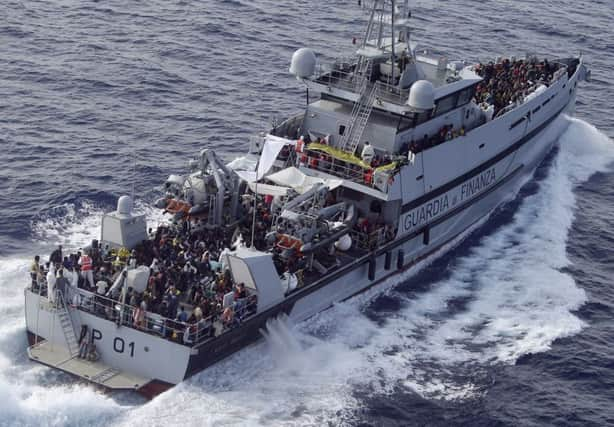EU leaders '˜killing by neglect' after cutting Mediterranean rescues


The Italy-led search and rescue mission, Mare Nostrum, ended in October 2014 and was replaced by Triton, which deployed fewer ships and prioritised deterring migrants over rescue operations, the report says.
Charities and UN officials warned the move could have a disastrous impact and lead to far more deaths at sea.
Advertisement
Hide AdAdvertisement
Hide AdDocuments unearthed by British universities showed the European border force Frontex pushed ahead with the change despite an internal assessment warning that if it was not properly planned it “would likely result in a higher number of fatalities”.
The subsequent scaling back of search and rescue operations during the growing migrant crisis “created the conditions that led to massive loss of life”, the damning report states.
Over 1,500 migrants died trying to cross the sea in the months after the change was implemented, according to the report, Death By Rescue: The Lethal Effects Of The EU’s Policies Of Non-assistance At Sea.
Charles Heller, from the University of Goldsmiths and co-author of the report, said policymakers were guilty of “institutionalised wilful neglect”.
He said: “Can we really qualify the ending of Mare Nostrum and its replacement by Triton in all knowledge of the consequences this would have, as a mistake?
“I would rather argue that this was a case of institutionalised wilful neglect, and that European policymakers and Frontex have made themselves guilty of killing by omission.
“Simply arguing that it was a mistake is insufficient. And if, as we show, policymakers and European agencies decided to disregard the risk their policy would entail for migrants, they should be held accountable for that negligence.”
The report found European policymakers came to regard Mare Nostrum as a “pull factor” which encouraged migrants to make the perilous crossing because they knew they would be rescued if they got into difficulty. It was scrapped in October 2014 and replaced by Triton, which deployed fewer vessels, patrolled an area further away from the Libyan coast where many migrants got into trouble, and did not have rescue as its operational priority.
Advertisement
Hide AdAdvertisement
Hide AdBut as the conflicts in Syria and Libya deepened, migrants continued to resort to people smugglers who packed them on to dinghies.
The number of migrants crossing the Mediterranean in the first four months of 2014 and 2015 stayed the same at 26,000, but death rates soared.
Sixty died in the first four months in 2014, but 1,687 died in the same four months the following year, meaning the chances of dying at sea increased 30-fold.
Charities warned the change could cost lives while Francois Crepeau, the UN rapporteur on migrant rights, said it amounted to saying “let them die because this is good deterrence”.